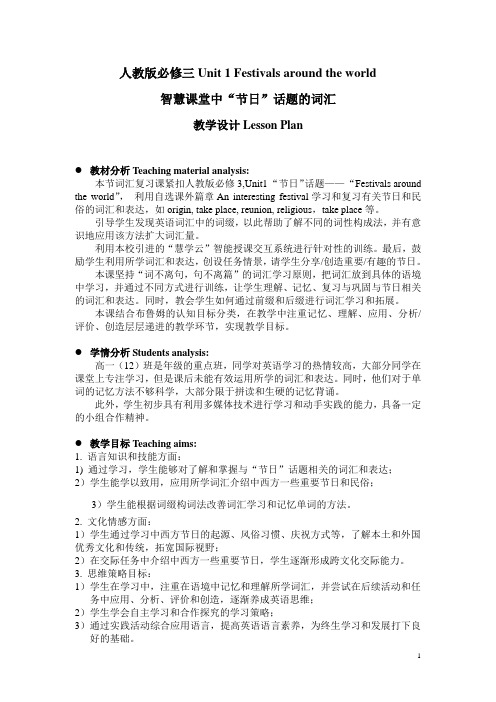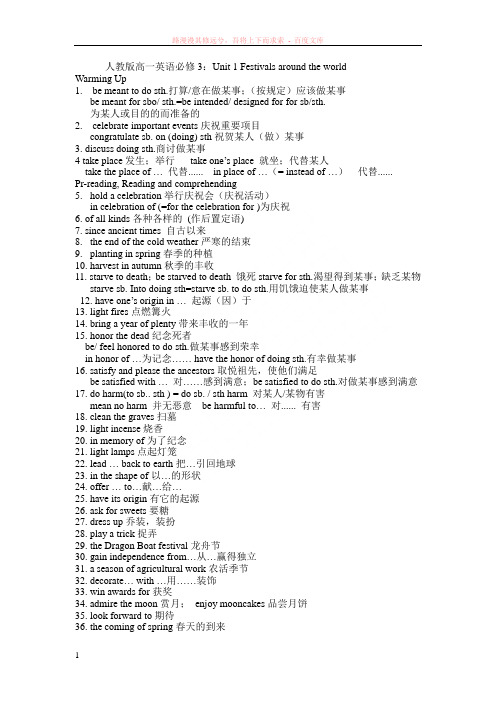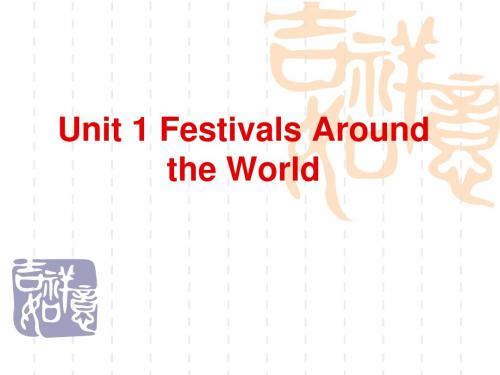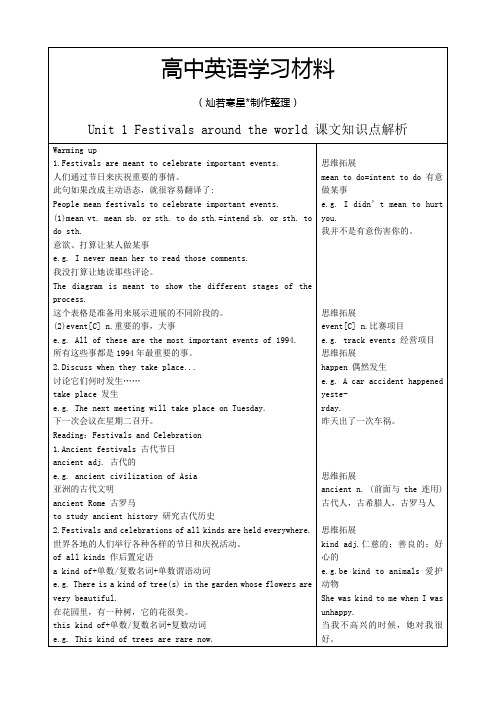人教版英语必修三Unit1 Festivals around the world语法教案
人教高中英语 必修3 unit1 Festivals around the world

各种各样的 相同种类的 不同种类的 这(那)种 某种
① 我们卖各式各样的鞋。 We sell all kinds of shoes.
= We sell shoes of all kinds. ②那类问题是很难解答的。
That kind of questions is very difficult to answer. = Questions of that kind are difficult to answer.
I mean the room for my bedroom. had meant to 本来打算做 I had meant to do English exercises first.
---You should have thanked her before you left.
---I meant __B___, but when I was leaving I couldn’t find her anywhere.
take place与happen take place:发生,举行;侧重安排或计划 而发生的事,带有“非偶然”的意思。
The Olympic Games take place every four years. happen:常指客观事物或情况偶然、不 可预料地发生。(happen to … 碰巧发生)
A. to do B. to C. doing D. doing so
想一想
2.take place发生,举行
<不及物动词,不用于被动语态> Our school sports meeting will take place next
week. Great changeds have takent. (1) 庆祝;祝贺
人教版必修三Unit 1《Festivals around the world》word教案

高中英语教学案例(新课标人教版必修3)Unit 1 . Festivals around the worldI. Learning objectives and demands1. Learn how festivals began and how festivals celebrated.2. Developing the ability of reading: scanning and skimming3. Learn more knowledge of foreign cultures and develop the sense of protecting Chinese culture.II. Teaching important point1、Learn how different festivals began and celebrated .2、Let students learn more about history and basic knowledge of festivals.III. Teaching difficult point1、Learn the basic method of reading.2、Enable students to talk about festivals and celebrations.IV. Teaching aidsA computer and projectorV. Teaching procedures:Step 1.Leading-inHave a free talk with students. Ask them the following questions:T: Hello, everybody! Welcome back to school! Did you have a good time during your winter holidays?Ss: Yes. Of course!T: When did you feel most happy and excited?Ss: At the Spring Festival.T: Who can tell us why? V olunteers!S1: Because it’s the most important festival i n our country.S2: Because I got much lucky money from my parents, grandparents and my relatives.S3: Because I needn’t study at festivals and there was lots of delicious food to eat. How great!S4: Because I met my cousins and old friends who I hadn’t see n for a long time and we had a very good time together.T: Excellent work! I am glad to hear that. Now let’s talk about FESTIV ALS, which are meant to celebrate important events. Please think about other Chinesefestivals.Then discuss in pairs what other Chinese festivals you know and choose three festivals to talk about.Step 2.Warming up1.Let students brainstorm the other Chinese festivals:(Lantern Festival, Pure Brightness Festival, Dragon Boat Festival, Mid-Autumn Festival, New Year′s Day, Chung Yeung Festival…)2.Let students work in groups and find the information about Chinese festivals.3.Ask students to fill in the following form and ask some to share their opinions with the whole class. The first one is given as an example.Step 3. Pre-readingT: Ask the students whether they know any festivals of foreign countries.Ss: Christmas Day 、Easter Day、Valentine’s Day 、Halloween……Tell the students we’ll learn something about some festivals in foreign countries. Step 4. ScanningLet the students read the passage silently and quickly and ask them for the main idea. And then ask them how many kinds of festivals are mentioned in the passage. Step 5. ListeningPlay the MP3 of the passage on the computer. And then do the true or false questions :1. The ancient people needn’t worry about their food.2. People celebrate Halloween with a different purpose from the past.3. Gandhi was a great leader who Indian people honor a lot.4. China and Japan share the same custom of celebrating Mid-Autumn Festival.5. Easter just celebrates the rebirth of Jesus6. In some Western countries there are very exciting carnivals, which take place fourteen days before Easter.Keys: 1.F2.T3.T4.T5.F6.FStep 6. Careful reading1.Let the students read the passage carefully and finish the form.(Let students look through the chart and then read the text silently. Three minuteslater, check the answers with the whole class.)2.Answer the following questions:1) At what occasions would the ancient people celebrate?2) What are the names of the festivals of the dead in different countries?3) Who do you think should have a festival to be honored? Why?4) What do people usually do when Chinese Mid-Autumn Festival arrives?5) Why is the Spring Festival popular? Talk about all the cultural practices you know of at the Spring Festival.Step 7. ConsolidationAsk students to talk about festivals in their own words according to the text. Then let them complete the following passage with proper words or phrases.There are al kinds of festivals and around the world, which are held for different . The ancient festivals were mainly held at three times a year-the end of the cold ,planting in spring and in autumn. Some festivals are held to the dead or the ancestors, who might return either to help or , while other festivals are held to honor famous people or to the ,such as Dragon Boat Festival, Columbus Day, and so on. Harvest andfestivals are happy events because their food is for the winter and the work is over, to which Mid Autumn Festival belongs. And the most and important festivals are the ones that the end of winter and to the coming of such as the Lunar New Year, at which people have a very .Suggested answers: celebrations; reasons; weather; harvest; honor; to satisfy; to do harm; gods; Thanksgiving; gathered; agricultural; energetic; look forward to; spring; good time.Step 8. Homework1.Learn the useful new words and expressions in this part by heart.2.Read the reading passage again and try to talk about festivals both in and out of China.。
人教版高中英语必修三Unit1Festivalsaroundtheworld

人教版必修三Unit 1 Festivals around the world智慧课堂中“节日”话题的词汇教学设计Lesson Plan●教材分析Teaching material analysis:本节词汇复习课紧扣人教版必修3,Unit1 “节日”话题——“Festivals around the world”,利用自选课外篇章An interesting festival学习和复习有关节日和民俗的词汇和表达,如origin, take place, reunion, religious,take place等。
引导学生发现英语词汇中的词缀,以此帮助了解不同的词性构成法,并有意识地应用该方法扩大词汇量。
利用本校引进的“慧学云”智能授课交互系统进行针对性的训练。
最后,鼓励学生利用所学词汇和表达,创设任务情景,请学生分享/创造重要/有趣的节日。
本课坚持“词不离句,句不离篇”的词汇学习原则,把词汇放到具体的语境中学习,并通过不同方式进行训练,让学生理解、记忆、复习与巩固与节日相关的词汇和表达。
同时,教会学生如何通过前缀和后缀进行词汇学习和拓展。
本课结合布鲁姆的认知目标分类,在教学中注重记忆、理解、应用、分析/评价、创造层层递进的教学环节,实现教学目标。
●学情分析Students analysis:高一(12)班是年级的重点班,同学对英语学习的热情较高,大部分同学在课堂上专注学习,但是课后未能有效运用所学的词汇和表达。
同时,他们对于单词的记忆方法不够科学,大部分限于拼读和生硬的记忆背诵。
此外,学生初步具有利用多媒体技术进行学习和动手实践的能力,具备一定的小组合作精神。
●教学目标Teaching aims:1. 语言知识和技能方面:1) 通过学习,学生能够对了解和掌握与“节日”话题相关的词汇和表达;2)学生能学以致用,应用所学词汇介绍中西方一些重要节日和民俗;3)学生能根据词缀构词法改善词汇学习和记忆单词的方法。
人教版高中英语(必修3)unit1festivalsaroundtheworld

人教版高一英语必修3:Unit 1 Festivals around the worldWarming Up1.be meant to do sth.打算/意在做某事;(按规定)应该做某事be meant for sbo/ sth.=be intended/ designed for for sb/sth.为某人或目的的而准备的2.celebrate important events庆祝重要项目congratulate sb. on (doing) sth祝贺某人(做)某事3. discuss doing sth.商讨做某事4 take place发生;举行take on e’s place 就坐;代替某人take the place of …代替...... in place of …(= instead of …)代替......Pr-reading, Reading and comprehending5.hold a celebration举行庆祝会(庆祝活动)in celebration of (=for the celebration for )为庆祝6. of all kinds各种各样的(作后置定语)7. since ancient times 自古以来8.the end of the cold weather严寒的结束9.planting in spring春季的种植10.harvest in autumn秋季的丰收11. starve to death;be starved to death 饿死starve for sth.渴望得到某事;缺乏某物starve sb. Into doing sth=starve sb. to do sth.用饥饿迫使某人做某事12. have one’s origin in …起源(因)于13. light fires点燃篝火14. bring a year of plenty带来丰收的一年15. honor the dead纪念死者be/ feel honored to do sth.做某事感到荣幸in honor of …为记念…… have the honor of doing sth.有幸做某事16. satisfy and please the ancestors取悦祖先,使他们满足be satisfied with …对……感到满意;be satisfied to do sth.对做某事感到满意17. do harm(to sb.. sth ) = do sb. / sth harm 对某人/某物有害mean no harm 并无恶意be harmful to…对...... 有害18. clean the graves扫墓19. light incense烧香20. in memory of为了纪念21. light lamps点起灯笼22. lead … back to earth把…引回地球23. in the shape of以…的形状24. offer … to…献…给…25. have its origin有它的起源26. ask for sweets要糖27. dress up乔装,装扮28. play a trick捉弄29. the Dragon Boat festival龙舟节30. gain independence from…从…赢得独立31. a season of agricultural work农活季节32. decorate… with …用……装饰33. win awards for获奖34. admire the moon赏月;enjoy mooncakes品尝月饼35. look forward to期待36. the coming of spring春天的到来37.give children lucky money in red paper用红包装着压岁钱给小孩38. dragon dances舞龙灯39. the lunar New Year阴历新年40.day and night整天;日夜41.colorful clothing of all kinds各种艳丽的衣服42. Christian countries信奉基督教的国家43. be covered with被…罩着44. as though好像45.love to get together to eat, drink and have fun with each other喜欢聚在一起吃、喝、玩耍have fun with sb. =enjoy oneself / have a good time with sb.与某人一起玩得愉快46.enjoy life享受生活47. forget our daily work for a little while暂时忘记日常生活中的烦恼Learning about language and using langbuage48. have a good time with和…一起开心49. at the parking lot在停车场50. be heart-broken心都碎了51. at the coffee shop在咖啡馆里;after work下班后52. turn up出现53. right now立刻54. keep one’s word守信用55. hold one’s breath屏气56. drown one’s sadness in coffee用咖啡来解愁57. wipe the table擦好桌子58. visit the earth下凡来到人间;(be) on earth在人间59. the herd boy牛郎60. set off for home动身回家61. remind sb. of …因…想起某人62.pass the tea shop on the corner路过在转角处的茶馆63. wave at sb. 向某人招手Workbook64. wipe all one’s tears拭去泪水;hide the sadness on one’s face掩盖住脸上的悲伤65. dream about going back to one’s homeland 日夜梦想回到祖国66. win the beat actor at the Golden Rooster Award 荣获金鸡奖的最佳男演员67.be ready for a second try准备第二次尝试68.leave sb. alone让某人一个人呆会69. full-time workers全职工70.have free time有时间71 ask for permission请求许可72.have an eye examination参加一个视力检测73.sit in a café坐在咖啡厅里74.32 degrees below freezing零下32度75. pile… up along the sidewalks沿着人行道把…堆起来76. ride in horse carriage乘座马车77.admire the ice sculptures欣赏冰雕78. be dressed in heavy clothes穿了厚厚的衣服。
人教版高中英语必修3 unit1 Festivals around the world 课件

Mexico
Halloween
western countries
Dragon Boat Festival
China
Festivals to Honor People
Columbus Day
USA
Festival to Honor Gandhi
India
Harvest Festivals
Thanksgiving
Unit 1 Festivals around the world
Spring Festival Christmas
Unit 1 Festivals around the world
Tibetan New Year
Unit 1 Festivals around the world
Task 1
Scanning
Easter and some western
carnivals
countries
Cherry Blossom Japan Festival
Kinds of Festivals
Names of Festivals
Countries
Obon
Japan
Festivals of the Dead
Day of the Dead
A. 生病 B. 发疯
C. 受伤 D. 挨饿
2.Which one is used to honour someone?
A. Spring Festival
B. Thanksgiving
C. Dragon Boat Festival
D. Mid-autumn Day
3. Which of the following is not mentioned?
人教版英语必修3 Unit1 Festivals around the world

Unit1 Festivals around the worldTeaching aims:1. TopicFestivals; how festivals begin; how to celebrate festivals2. Useful words and expressions:Starve plenty satisfy ancestor lamp lead feast bone origin trick poet arrival national gain independence gather agricultural European custom award watermelon handsome rooster admire energetic forward Easter clothing religious social Christian daily permission possibility fool apologise drown sadness obvious wipe lovely couple weep announcer forgiveTake place in memory of dress up play a trick look forward to day and night as though have fun with turn up keep one’s word hold one’s breath 3. Functional items:1)RequestCould /Would you please…?Could I have…?Could we look at…?I look forward to ….May I see…?2)ThanksIt’s very kind of you…Thank you very much/thanks a lot.I’d love to.It was a pleasure….Don’t mention it.You are most welcome.4. Structures情态动词can, could, may, might, will, would, shall, should, must, can’t 等的用法。
人教版高中英语必修3: unit1 festivals around the world

Honour
Festival
People
Columbus Day
ห้องสมุดไป่ตู้
festival to
honor Gandhi
China USA India
Harvest harvest/ Festivals Thanksgiving
festivals mid-autumn festivals
European and other countries China and Japan
Spring Festival
January / February The end of winter, arrival of spring,
Lunar New Year, reunion with family and relatives red paper; dragon dances; eat dumplings; New Year’s visit
Unit 1 Festivals Around the World
What is the festival in the picture?
Chinese festivals
Spring Festival
Lantern Festival
…
Chinese Festival
The Double Ninth Day
their food.
F
People celebrate Halloween with a different purpose from the past.
T
Gandhi was a great leader who Indian
people honour a lot.
人教版高中英语必修三Unit1Festivalsaroundtheworld课文知识点解析

happy memories of his stay in London
对在伦敦幸福的记忆
8.lead the ancestors back to earth
把祖先带回到地球
lead sb. to...把某人带到……
e.g. He led us to his home.
plenty n./pron. 足够;大量
e.g. years of peace and plenty 太平丰收年
There is plenty of room in my bag.
我包里还很空。
6.Some festivals are held to honor the dead,or satisfy and please the ancestors,who could return either to help or do harm.
一些人可能因为他们的动物,花,果实和蔬菜而赢得奖品。
award[C] n. 评价 报酬 奖品
e.g.He has won the best actor award.
他已经获得了最佳男演员奖。
19.In China and Japan there are mid-autumn festivals,when people admire the moon and give gifts of mooncakes.
People mean festivals to celebrate important events.
(1)mean vt. mean sb. or sth. to do sth.=intend sb. or sth. to do sth.
- 1、下载文档前请自行甄别文档内容的完整性,平台不提供额外的编辑、内容补充、找答案等附加服务。
- 2、"仅部分预览"的文档,不可在线预览部分如存在完整性等问题,可反馈申请退款(可完整预览的文档不适用该条件!)。
- 3、如文档侵犯您的权益,请联系客服反馈,我们会尽快为您处理(人工客服工作时间:9:00-18:30)。
人教版高中英语必修三Unit1 Festivals around the world语法教案教学过程一、复习预习依据语境记词汇(Ⅰ)单词拼写1.It is difficult to get used to another country’s customs (习俗).2.I admire (钦佩) him very much for he is a learned and kind man.3.He was awarded (授予) the first prize in the competition.4.The studies find that people who are able to forgive (原谅) feel less stress and less depression.5.We enjoy the harmony of school life, in which we can gain (获得) a better result of study.6.On his arrival (到达) at the railway station, he was told that his train was delayed for two hours.7.Having not been given the gift, little Tom wept (哭泣) after the ceremony.8.They receive baskets full of food and clothing (衣服) from the people they work for.(Ⅱ)语境填词(用所给词的适当形式填空)1.Kelly wrote a letter to Kim to apologize for her calling her nickname, but Kim didn’t accept her apology.(apologize)2.Even if you have a permit, I won’t permit you to enter the hall without my permission.(permit)二、课堂导入概念引入情态动词The classroom can seat thirty students. 这教室能坐三十位学生。
You must obey the school rules.你必须遵守校规。
It is cold in the room. They musthave turned off the heating. 屋里很冷,他们肯定把暖气关了。
It must / may / might / could have rained last night .The ground is wet. 地湿了,昨晚肯定/可能/也许下雨了。
三、知识讲解知识点1 情态动词概念:在动词(一般动词)之前形成动词的否定,疑问,时态,语态,语气或表示特殊意义的动词叫做助动词,其中具有感情色彩一些助动词叫做情态动词。
情态动词是一种本身有一定的词义,但要与动词原形及其被动语态一起使用,给谓语动词增添情态色彩,表示说话人对有关行为或事物的态度和看法,认为其可能、应该或必要等。
情态动词后面加动词原形。
知识点2 情态动词分组辨析:1.【考查点】can和could (could为can的过去式) 的基本用法(1)表示能力,如:He can speak English better than you.can和be able to都可表示能力,两者在意思上没有什么区别。
但是can只能有现在式和过去式,而be able to则有更多的形式,可位于情态动词之后或表达过去成功地做了某事。
如:He will be able to do the work better.He was able to finish the work on time.(2) 表示客观的可能性Accidents can happen to any drunken driver.According to the radio, it could rain this afternoon.(3)表示“许可”时can可以和may换用,如:You can (may) go home now.如果要表示语气婉转,可用could代替can,这时could不再是can 的过去式,注意回答时不能用could。
如:---- Could you come again tomorrow?---- Yes, I can./ No, I can’t.(3) 在疑问句和否定句中表示怀疑、惊奇、不相信的态度。
如:Can this green bike be Liu Dong's?How can you believe such a liar like him?(4) 用于肯定句,表示一时的情况,意为:有时候会。
如:It can be very hot here in summer.Tom is a clever boy, but he can be dull sometimes.2.【考查点】may和might (might为may的过去式)的基本用法(1)表示允许或许可,否定用mus tn’t, 表禁止。
如:---- May we swim in this lake?---- No, you mustn't. It's too dangerous.肯定可以用比较婉转的说法进行回答。
如:---- May I use this dictionary?---- Yes, please. /Certainly. / Yes, you can.(2)在表示请求、许可时,用might比may 语气更婉转些, 如:May I have a look at your new computer?May I…?在文体上较正式,较客气,日常口语中常用Can I…?[(3)may或might都可以表示可能性,表示"或许"、"可能"之意,如果用might表示可能性,则语气更加不肯定,如:They may (might) be in the library now.He is absent. He may/ might be ill.(4)May 用于祈使句,表示祝愿。
如:May you have a happy life.May you succeed.比较Wish you a happy new year.Wish you success.3.【考查点】must的基本用法(1)must表示“必须”、“应该”之意,语气比should, ought to强烈,其否定式must not,缩写形式为mustn’t,表示“不准”、或“禁止”之意,如:We must study hard and make progress every day.You mustn't touch the fire.(2) 对以must提出的疑问句,如作否定回答时,要用needn‘t或用don’t (doesn‘t) have to (不必)来回答,而不用mustn’t,因为mustn‘t表示的是“禁止”或“不许可”之意,如:---- Must we finish the work tomorrow?---- No, you needn't (don't have to), but you must finish it in three days.(3) must可以表示推测,表示“一定”或“必定”之意,只用于肯定句中。
如:---- Whose new bike can it be?---- It must be Liu Dong's. I know his father has just bought him a new one.You must be ill. I can see it from your face.4.【考查点】have to 的基本用法(1)have to和must的意义相近,只是must侧重表示说话人的主观看法,而have to 则表示客观需要,如:I must study hard.You have to hand in your compositions before next Monday.(2)have to 有人称、数和时态的变化,否定式要用助动词,don’t have to如:They had to speed up, for the weather turned terrible.He has to stay at home because of illness5.【考查点】should的基本用法(1)should表示“建议”或“劝告”,有“应该”之意,可与ought to 互换。
如:You should learn from each other.You should/ ought to go and see Mary some time.(2)表示推测,译作:很可能,该,是说话人对客观事物的真实性做出较大可能性的判断。
如:It’s already 10. She promised to come by 10. She should be here at any moment.(3) why/how + should 表示“竟然”,含意外、惊异等语气。
Why should you be so late today?I don’t understand why you should think that I did it.(4)should后接完成式表示过去没有做到本来应该做的事情,或是做了本来不应该做的事情。
如:You should have given him more help.You shouldn’t have left home without saying a word.(5) 表示万一,用于if 从句Ask Tom to ring me up if you should see him.6.【考查点】will的基本用法(1) 可以表示“意志”或“决心”,如:I have told him again and again to stop smoking, but he will not listen.——Can someone help me?—— I will.(2)请求或询问对方的意愿,如:Will you please tell me how to get to the Capital Gymnasium?Will you open the window?(3)表示一种习惯性的动作,有“总是”或“惯于”之意,will 指现在,would 指过去。
